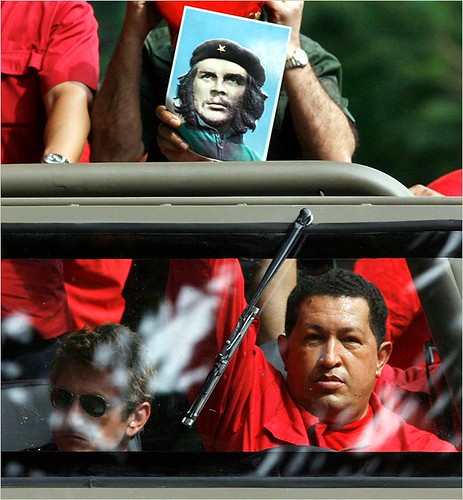Venezuela
Venezuela: Between assassination plots and abstention

By Federico Fuentes, Caracas
October 25, 2008 -- Talk of assassination plots and rising concerns about a high abstention rate have marked the beginning of the November 23 regional elections race here in Venezuela.
Formally at stake are 23 governorships, more than 300 mayorships and hundreds of representatives on the state legislative councils. However, the result of these elections could also have an important impact on the future of the Bolivarian Revolution led by the Chavez government.
During the November 2004 regional elections, the pro-Chavez forces, on the back of the thumping victory in the August 2004 recall referendum on Chavez’s mandate, painted the electoral map red as they swept into 21 of the 23 governorships up for election (they later rewon the governership of Amazonas to make it 22 out of 24 all up).
Tenue au Venezuela, à Caracas, du 8 au 11 octobre 2008 en présence d’experts et de chercheurs en provenance d'Argentine, d'Australie, de Belgique, du Canada, du Chili, de Chine, de Corée du Sud, de Cuba, d’Egypte, d'Équateur, d'Espagne, des États-Unis, des Philippines, de France, d'Angleterre, du Mexique, du Pérou, d'Uruguay et du Vénézuéla, la Conférence Internationale d'Économie Politique « Réponses du Sud à la Crise Économique Mondiale » a ouvert un large débat sur l'actualité économique et financière de l'économie mondiale, les nouvelles perspectives et les défis que doivent relever les gouvernements et les peuples du Sud.
Debemos aprender las lecciones del siglo XX para aplicarlas al comienzo del siglo XXI
Eric Toussaint
[Click HERE for the English translation]
By Eric Toussaint, translated by Federico Fuentes for Links International Journal of Socialist Renewal
October 11, 2008 -- Academics and researchers from Argentina, Australia, Belgium, Canada, Chile, China, Cuba, Ecuador, France, Mexico, Peru, Phillipines, South Korea, Spain, United Kingdom, United States, Uruguay and Venezuela participated in the International Political Economy Conference: Responses from the South to the Global Economic Crisis, held in Caracas October 8-11, 2008. The conference stimulated a wide-ranging debate on the current economic and financial health of the global economy, the new perspectives and the challenges to the governments and peoples of the South posed by the international financial crisis.
The meeting concluded that the situation has worsened in the last few weeks. It has progressed rapidly from being a series of crises in the financial markets of countries in the centre and has turned into an extremely serious international crisis. This means that countries in the South are in a very difficult situation.
The crisis threatens the real economy and, if energetic and effective actions are not taken immediately, all peoples in the world could be drastically punished; especially the least-protected and most-neglected sectors.
Capitalist versus socialist state intervention in the economy
By Martin Saatdjian
Human Rights Watch report on Venezuela: An echo of US propaganda
Statement by the Australia-Venezuela Solidarity Network
[Below is the political declaration of the founding congress of the United Socialist Party of Venezuela Youth, JPSUV, held on September 11-13, 2008. Translated by Federico Fuentes and Kiraz Janicke.
Truth suffers in Human Rights Watch report on Venezuela
By the Venezuela Information Office
On September 18, 2008 Human Rights Watch released a report entitled "Venezuela: Rights Suffer Under Chávez." The report contains biases and inaccuracies, and wrongly purports that human rights guarantees are lacking or not properly enforced in Venezuela. In addition, while criticising Venezuela's human rights in the political context, it fails to mention the many significant advancements made by the government on other essential human rights, such as access to education, healthcare, nutritious food, clean water and housing.
MYTH: "Discrimination on political grounds has been a defining feature of the Chávez presidency."